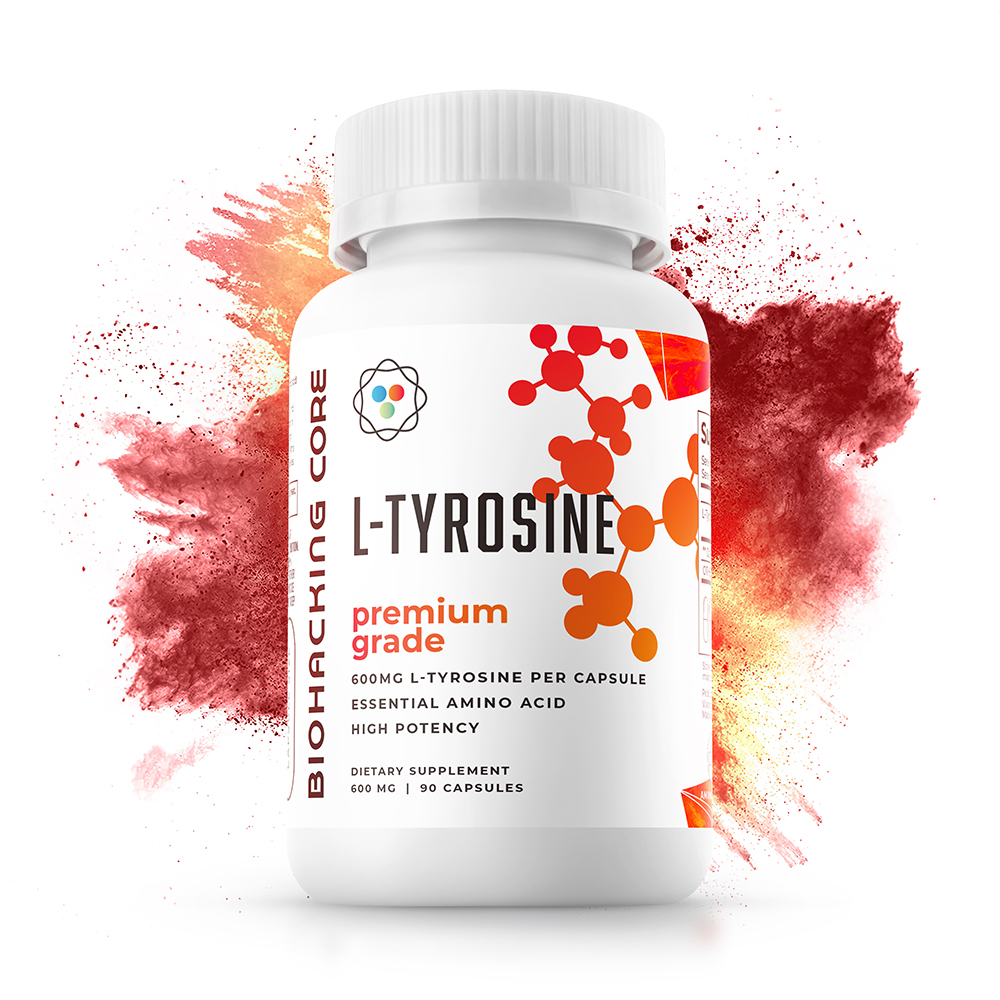

L-Tyrosine – Powder
- Category: Amino Acids
Form
Quantity
| Quantity | Discounted price | DISCOUNT |
|---|---|---|
| 3-5 | €19.00 | 5%$1.00 |
| 6-9 | €18.40 | 8%$1.60 |
| 10+ | €18.00 | 10%$2.00 |
Shipment will be on monday
DELIVER TO US
Delivery time not available contact us for more information
- Your Biohacking Experts.
- Mo-Fr Same day shipping for orders before 17:00.
- Free shipping for orders above 75eu.
- Superior Quality high purity extracts and compunds.
- Quantity based discounts applicable.
The amino acid L-tyrosine is a naturally occurring amino acid that is required for both physical and mental processes. It is the precursor of three of the most essential neurotransmitters: dopamine, adrenaline, and norepinephrine.
The normal synthesis of dopamine helps maintain mental focus and performance during exposure to environmentally adverse conditions and also limits mental fatigue during those same conditions.
Biohacking Core L-tyrosine is of the up-most quality and is guaranteed to provide the optimal results associated with the amino acid’s supplementation.
What Is L-Tyrosine?
L-tyrosine is a naturally-existing amino acid necessary for physical and mental performance. The amino acid contributes to the production of dopamine, adrenaline, and norepinephrine: three essential neurotransmitters in the human body.1
Dopamine is related to reward the reward center and plays an essential role in temperament, inspiration, and perception. Adrenaline and norepinephrine are the hormones behind the body’s fight, flight or freeze response to stress. Together, they impact energy levels by regulating heart rate, blood pressure, and blood sugar levels. These three neurotransmitters are called catecholamines and are partially synthesized from L-tyrosine.
Tyrosine is also vital for generating thyroid hormones that control the digestive system and melanin, a natural pigment in hair, skin, and eyes. High-protein dietary sources like dairy items, meats, fish, and eggs provide large amounts of the amino acid. The body also produces it from another amino acid called L-phenylalanine.
Since the body can create satisfactory amounts of L-tyrosine, supplementation isn’t necessary for good health.1 Some research suggests that supplementing with tyrosine can promote cognition, boost vitality, and improve mood, especially for individuals under stress.
Mechanism of Action
L-tyrosine’s mechanisms have been broadly examined and are well known. Nearly all of its functions relate to its use in producing catecholamine neurotransmitters. The purpose of L-tyrosine isn’t to create these neurotransmitters but to provide the raw material necessary for synthesizing them.
L-tyrosine is made when its precursor amino acid, phenylalanine, is metabolized within the liver. Having adequate levels of L-tyrosine gives a buffer of material, which the body can use when it needs to produce more catecholamines.
Severe physical or mental stress increases the release of adrenaline, norepinephrine, and dopamine, potentially leading to the rapid depletion of building blocks. When this occurs, the brain starts the process of making more building materials. It does so by discharging a protein that converts L-tyrosine into the catecholamine precursor L-DOPA and, after that, into dopamine. A portion of it gets oxidized and changed into norepinephrine and adrenaline.1
Because of the chain reaction, L-tyrosine supplementation might be beneficial. Maintaining adequate amino acid levels could help the body produce and release catecholamines even during extended periods of stress or stimulation.2
What Do L-Tyrosine Supplements Do?
L-tyrosine is a precursor amino acid for norepinephrine, dopamine, and adrenaline synthesis.3 The amino acid’s benefits become particularly pronounced during stressful periods.
When dealing with stressful conditions, these neurotransmitters can become depleted, leading to compromised cognitive function. Taking a supplement can prevent stress-induced cognitive decline by maintaining higher levels of catecholamines in the brain.
L-tyrosine supplementation provides an ‘extra stash’ the body needs to synthesize more of the necessary neurotransmitters before stress leads to their depletion. The result is superior cognitive performance, improved alertness, and a lower risk of feeling burned out.4
When supplementing with l-tyrosine, blood levels peak within an hour or two and remain elevated for up to eight hours.5 The amino acid then passes through the blood-brain barrier, allowing brain cells to use it fully. L-tyrosine gets converted to dopamine through a series of enzymatic reactions.6
Additionally, some data suggests that l-tyrosine can prevent acute memory loss during stressful periods.7
Benefits of L-Tyrosine Supplementation
Memory
L-tyrosine doses of 200 to 400 mg/kg may increase noradrenaline levels in the hippocampus and reduce the effects of acute stress.8 The amino acid’s ability to reverse short-term memory loss due to cold exposure is still not fully understood.
One study tested the effects of 150 mg/kg of L-tyrosine on cognition and memory in the face of cold exposure. The eight subjects were given L-tyrosine or a placebo before the experiment. They then went into a dark room where the temperature was lowered from 22 to 4 degrees C.
Researchers noted that those taking L-tyrosine completed a special memory-based test more quickly. Interestingly, the amino acid didn’t show the same benefits when the room temperature wasn’t reduced.
So far, no data suggests that L-tyrosine supplementation can boost memory under normal circumstances. Research only shows that it can slow down memory decline during high-stress periods.
Wakefulness
In one paper from 1995, researchers examined the effects of tyrosine supplementation on cognitive function during extended wakefulness.9 In the experiment, the subjects had to stay up all night performing various performance tasks. Researchers then gave half the subjects 150 mg/kg tyrosine and a placebo to the other half.
Tyrosine supplementation was linked to significant improvements in cognitive abilities and reduced sleep-related performance decline. The researchers concluded:
“..tyrosine may prove useful in counteracting performance decrements during episodes of sustained work coupled with sleep loss.”
Stress
Norepinephrine (NE) is exhausted by intense neural tissue stress (especially in the hypothalamus and brainstem).10 This depletion can cause changes in behavior, such as unconstrained motor activity11 and forceful actions12 as noted in animal studies.
Animal studies show that L-tyrosine administration (200-400 mg/kg) 30 to 60 minutes before exposure to an acute stressor may prevent the onset of stress-related behavioral issues.
Despite the small sample size, human tests have shown similar results.13141516 In one human study, the subjects were exposed to high elevations after taking 100 mg/kg of L-tyrosine (split into two doses taken one hour apart) or a placebo.16 The subjects taking tyrosine experienced fewer headaches and less stress, soreness, and coldness, as evaluated by the Environmental Symptoms Questionnaire.
Tyrosine supplementation also had strong positive effects on mood (as tested with the Clyde Mood Scale and Profile of Mood States) and cognitive function.
Other research has similar outcomes. The same dose (100 mg/kg) appears to reduce the adverse effects of high noise (up to 90 decibels)17 and cardiovascular stress.18
In one week-long experiment, 21 cadets had to complete a demanding military combat training course.19 The subjects were split into two groups. One group received a high-protein drink containing two grams of tyrosine, and the remaining subjects were given a placebo. The participants were examined before the start of the course and on day six.
Researchers found that subjects ingesting the high-protein drink performed better on memory and tracking tasks and had slightly lower blood pressure. Like other studies we’ve reviewed today, the authors suggested that tyrosine might help people maintain their performance and deal with stress better.
Neural Aging
Increasing brain concentrations of L-tyrosine shows promise as a pharmaceutical strategy for slowing down neural aging, seeing as catecholamines are depleted more rapidly in certain dementia conditions.
Catecholamines can function as antioxidants in the brain and offer neural protection.20 Supplementing with L-tyrosine would reduce the chance of depleting these neurotransmitters, allowing them to protect brain cells from oxidative stress and inflammation.
Blood Pressure
L-tyrosine doses of 150 mg/kg before a demanding and stressful cognitive test don’t appear to affect blood pressure.1
In one of the studies we reviewed above, cadets going through an intense week-long military course were given a high-protein drink containing two grams of tyrosine or a placebo.19 Tyrosine supplementation had minor positive effects on systolic blood pressure compared to placebo.
Supplementing with the amino acid also reduces diastolic blood pressure in lab animals.2122 Unfortunately, the results in the area are mixed because various stressors affect humans and animals in different ways. The effects of L-tyrosine appear similar under various conditions, but we need more research to conclude.
Physical Performance
L-tyrosine is typically taken to reduce the decline in neurological execution related to long-term mental effort (which can come in the form of studying or exercising). The amino acid is considered an effective precursor for delaying the onset of mental fatigue, with numerous studies showing improved mood, cognition, and overall productivity.
Unfortunately, we don’t have any significant data to suggest that tyrosine can have ergogenic effects.23
Recommended Dosage
To extend mental performance or relieve the impacts of stress, a single daily dose of 500–2000 mg of L-tyrosine has been proven to be secure and effective.1
1. PubChem. n.d. “Tyrosine.” Pubchem.ncbi.nlm.nih.gov. https://pubchem.ncbi.nlm.nih.gov/compound/tyrosine.
2. Fernstrom, John D., and Madelyn H. Fernstrom. 2007. “Tyrosine, Phenylalanine, and Catecholamine Synthesis and Function in the Brain.” The Journal of Nutrition 137 (6): 1539S1547S. https://doi.org/10.1093/jn/137.6.1539s.
3. Nakashima, A., N. Hayashi, Y. S. Kaneko, K. Mori, E. L. Sabban, Toshiharu Nagatsu, and A. Ota. 2009. “Role of N-Terminus of Tyrosine Hydroxylase in the Biosynthesis of Catecholamines.” Journal of Neural Transmission (Vienna, Austria: 1996) 116 (11): 1355–62. https://doi.org/10.1007/s00702-009-0227-8.
4. Webster, Diana, and Joanne Wildgoose. “Tyrosine Supplementation for Phenylketonuria.” The Cochrane Database of Systematic Reviews, no. 6 (June 5, 2013): CD001507. https://doi.org/10.1002/14651858.CD001507.pub3.
5. Glaeser, B. S., E. Melamed, J. H. Growdon, and R. J. Wurtman. 1979. “Elevation of Plasma Tyrosine after a Single Oral Dose of L-Tyrosine.” Life Sciences 25 (3): 265–71. https://doi.org/10.1016/0024-3205(79)90294-7.
6. Kaufman, S., and S. Friedman. 1965. “DOPAMINE-BETA-HYDROXYLASE.” Pharmacological Reviews 17 (June): 71–100. https://pubmed.ncbi.nlm.nih.gov/14294032/.
7. Shurtleff, David, John R. Thomas, John Schrot, Kathleen Kowalski, and Robert Harford. 1994. “Tyrosine Reverses a Cold-Induced Working Memory Deficit in Humans.” Pharmacology Biochemistry and Behavior 47 (4): 935–41. https://doi.org/10.1016/0091-3057(94)90299-2.
8. Yeghiayan, Sylva K., Shuqin Luo, Barbara Shukitt-Hale, and Harris R. Lieberman. 2001. “Tyrosine Improves Behavioral and Neurochemical Deficits Caused by Cold Exposure.” Physiology & Behavior 72 (3): 311–16. https://doi.org/10.1016/s0031-9384(00)00398-x.
9. Neri, D. F., D. Wiegmann, R. R. Stanny, S. A. Shappell, A. McCardie, and D. L. McKay. “The Effects of Tyrosine on Cognitive Performance during Extended Wakefulness.” Aviation, Space, and Environmental Medicine 66, no. 4 (April 1995): 313–19.
10. Weiss, Jay M., Prudence A. Goodman, Barbara G. Losito, Sheila Corrigan, Jonathan M. Charry, and William H. Bailey. 1981. “Behavioral Depression Produced by an Uncontrollable Stressor: Relationship to Norepinephrine, Dopamine, and Serotonin Levels in Various Regions of Rat Brain.” Brain Research Reviews 3 (2): 167–205. https://doi.org/10.1016/0165-0173(81)90005-9.
11. Weiss, Jay M. 1971. “Effects of Coping Behavior in Different Warning Signal Conditions on Stress Pathology in Rats.” Journal of Comparative and Physiological Psychology 77 (1): 1–13. https://doi.org/10.1037/h0031583.
12. Brady, Kathleen, John W. Brown, and John B. Thurmond. 1980. “Behavioral and Neurochemical Effects of Dietary Tyrosine in Young and Aged Mice Following Cold-Swim Stress.” Pharmacology Biochemistry and Behavior 12 (5): 667–74. https://doi.org/10.1016/0091-3057(80)90146-x.
13. Lehnert, Hendrik, Daniel K. Reinstein, Benjamin W. Strowbridge, and Richard J. Wurtman. 1984. “Neurochemical and Behavioral Consequences of Acute, Uncontrollable Stress: Effects of Dietary Tyrosine.” Brain Research 303 (2): 215–23. https://doi.org/10.1016/0006-8993(84)91207-1.
14. Rauch, T.Michael, and Harris R. Lieberman. 1990. “Tyrosine Pretreatment Reverses Hypothermia-Induced Behavioral Depression.” Brain Research Bulletin 24 (1): 147–50. https://doi.org/10.1016/0361-9230(90)90299-f.
15. Marriott, Bernadette M, and Institute Of Medicine (U.S.). Committee On Military Nutrition Research. 1994. Food Components to Enhance Performance : An Evaluation of Potential Performance-Enhancing Food Components for Operational Rations. Washington, D.C.: National Academy Press.
16. Banderet, Louis E., and Harris R. Lieberman. 1989. “Treatment with Tyrosine, a Neurotransmitter Precursor, Reduces Environmental Stress in Humans.” Brain Research Bulletin 22 (4): 759–62. https://doi.org/10.1016/0361-9230(89)90096-8.
17. Deijen, J.B, and J.F Orlebeke. 1994. “Effect of Tyrosine on Cognitive Function and Blood Pressure under Stress.” Brain Research Bulletin 33 (3): 319–23. https://doi.org/10.1016/0361-9230(94)90200-3.
18. Dollins, Andrew B., Larry P. Krock, William F. Storm, Richard J. Wurtman, and Harris R. Lieberman. 1995. “L-Tyrosine Ameliorates Some Effects of Lower Body Negative Pressure Stress.” Physiology & Behavior 57 (2): 223–30. https://doi.org/10.1016/0031-9384(94)00278-d.
19. Deijen, J.B, C.J.E Wientjes, H.F.M Vullinghs, P.A Cloin, and J.J Langefeld. 1999. “Tyrosine Improves Cognitive Performance and Reduces Blood Pressure in Cadets after One Week of a Combat Training Course.” Brain Research Bulletin 48 (2): 203–9. https://doi.org/10.1016/s0361-9230(98)00163-4.
20. Jodko, Katarzyna, and Grzegorz Litwinienko. “[Oxidative stress in the neurodegenerative diseases–potential antioxidant activity of catecholamines].” Postepy Biochemii 56, no. 3 (2010): 248–59.
21. Yamori, Yukio, Michihiro Fujiwara, Ryoichi Horie, and Walter Lovenberg. 1980. “The Hypotensive Effect of Centrally Administered Tyrosine.” European Journal of Pharmacology 68 (2): 201–4. https://doi.org/10.1016/0014-2999(80)90323-4.
22. Sved, A F, J D Fernstrom, and R J Wurtman. 1979. “Tyrosine Administration Reduces Blood Pressure and Enhances Brain Norepinephrine Release in Spontaneously Hypertensive Rats.” Proceedings of the National Academy of Sciences 76 (7): 3511–14. https://doi.org/10.1073/pnas.76.7.3511.
23. Meeusen, Romain, Phil Watson, and Jiri Dvorak. 2006. “The Brain and Fatigue: New Opportunities for Nutritional Interventions?” Journal of Sports Sciences 24 (7): 773–82. https://doi.org/10.1080/02640410500483022.
Latest Blogs
But I must explain to you how all this mistaken idea of denouncing pleasure

Research on Sabroxy®
Sabroxy® is a relatively new product on the market that's been making some headlines recently. Unlike many popular nootropics, Sabroxy®...
Read More
What Is Biohacking?
While the term “biohacking” has gained momentum in recent years, its meaning can differ depending on the context in which...
Read More
Research on PrimaVie® Shijalit
The market is full of countless substances touted for their positive impact on brain health, cognition, mood, energy levels, and...
Read More
Level Up: Unearth Our Unsurpassed Quality!
CONTACT

0 reviews
Only logged in customers who have purchased this product may leave a review.